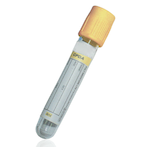Alpha Fetoprotein (AFP)
Specimen Volume
1mL (~250uL sample)Sample Preparation
Centrifuge as per normal procedures
Turnaround Time
24 hoursSample Processing In Laboratory
No special requirementsSample Stability
7 days at 2-8°CGeneral Information
Alpha-fetoprotein (AFP) is a glycoprotein with a single polypeptide chain and a molecular weight of approximately 70,000 Daltons. AFP is mainly synthesised in the liver, gastrointestinal tract and the yolk sac of the foetus and is secreted in the foetal serum, reaching a peak in the 13th week of pregnancy and then gradually decreases to healthy adult concentrations (<6kU/L) at about 1-2 years of age. With the exception of pregnancy, serum AFP concentrations remain low in a healthy adult. In adults the half-life of AFP in serum is approximately 5 days.
AFP is used as a tumour marker for the detection and monitoring of primary liver cell carcinomas (hepatocellular carcinomas) and germ cell tumours of the ovary and testis. In patients at risk of developing hepatocellular carcinoma, e.g. those with cirrhosis or chronic hepatitis, AFP determination can be used for early detection of carcinoma. Serum AFP concentration correlates with the size of the tumour and has some prognostic significance.
Elevated serum concentrations are also found in non-seminomatous testicular carcinomas. Serum AFP is useful in assessing response of the tumour to therapy, with successful treatment leading to a progressive fall in the AFP concentration with a return to normal. If AFP does not fall at the expected rate, this suggests the presence of residual tumour.
Patient Preparation
No specific patient preparation. Sample should be collected into a yellow or red top only.
Notes
Serum AFP concentrations may be elevated in several cancers e.g. gastric carcinoma, colorectal carcinoma, biliary carcinoma, pancreatic carcinoma and metastatic liver cancer, and in the following benign conditions: hepatitis, liver cirrhosis, Crohn’s disease, and polyposis. Elevated serum AFP concentrations are not absolute evidence of the presence of malignant disease, and should be used in conjunction with other diagnostic and clinical information.
AFP determination in maternal serum during pregnancy helps to establish open neural tube defects in the foetus. Relatively low AFP concentrations in maternal serum may be indicative of Down’s syndrome, hydatidiform mole or an undetected abortion. These are specialist applications and these services are provided by Birmingham Women’s Hospital.
Reference Range
0-7 KU/L
Source of Reference Range
Abbott DiagnosticsSpecifications
- EQA Status: Edinburgh NEQAS
- EQAS Scheme: Yes








